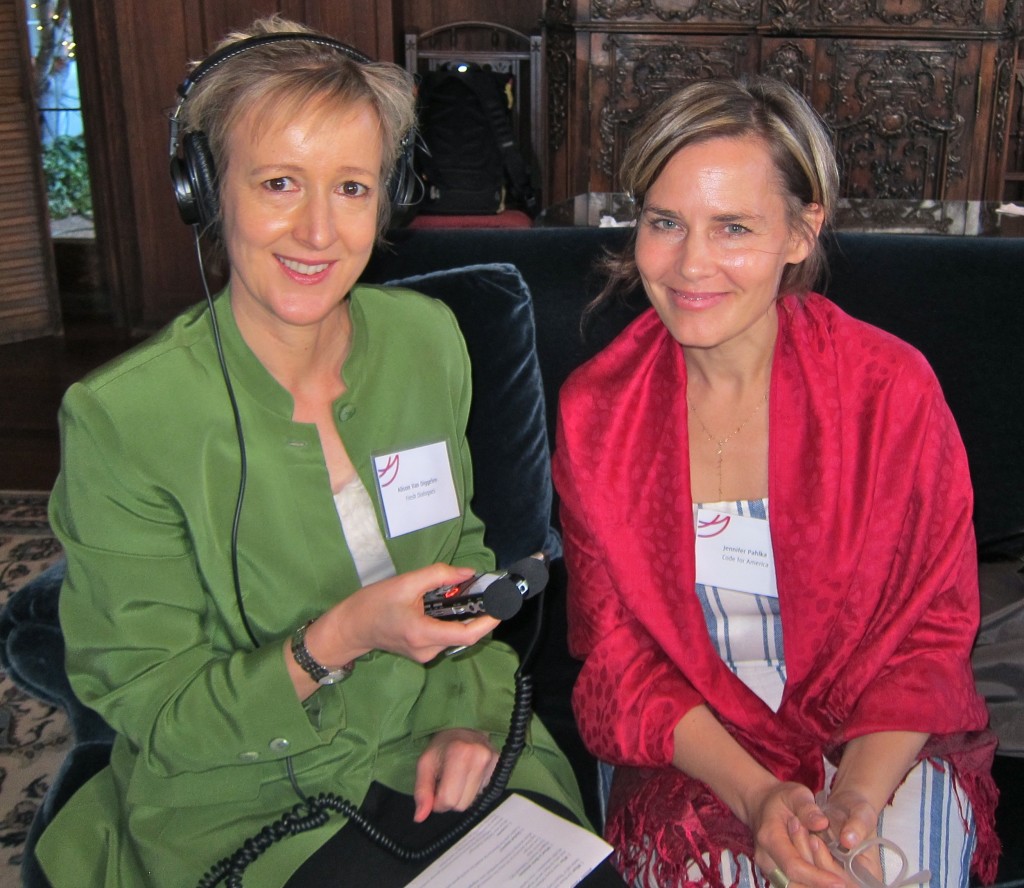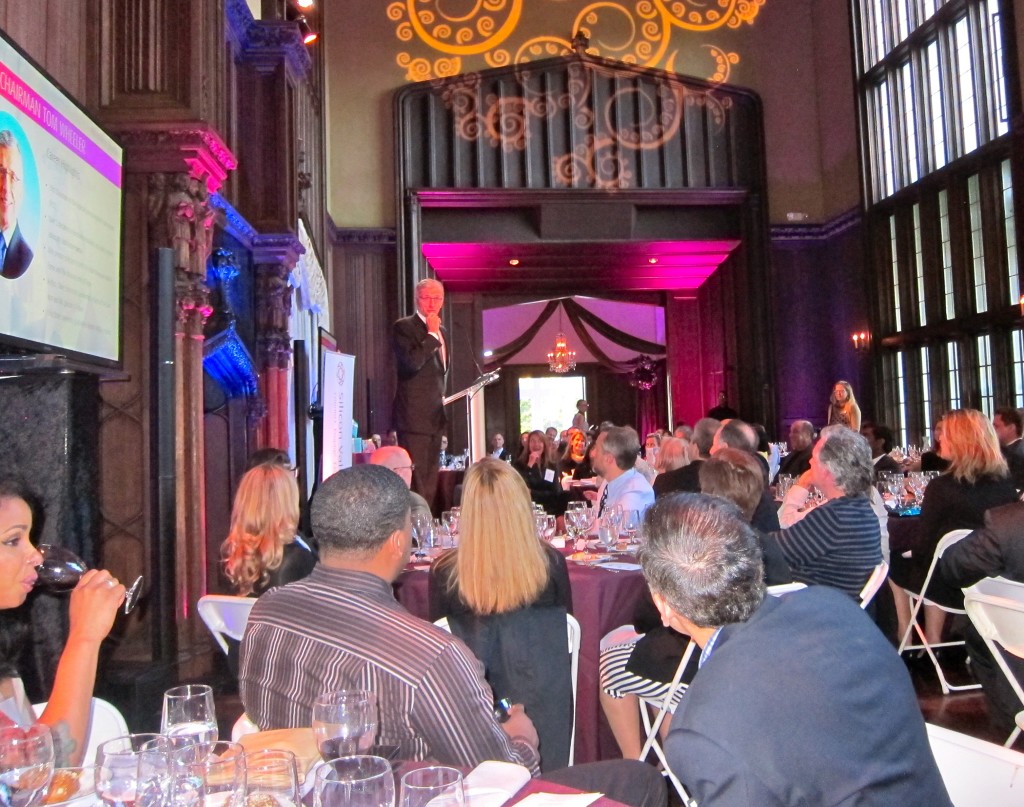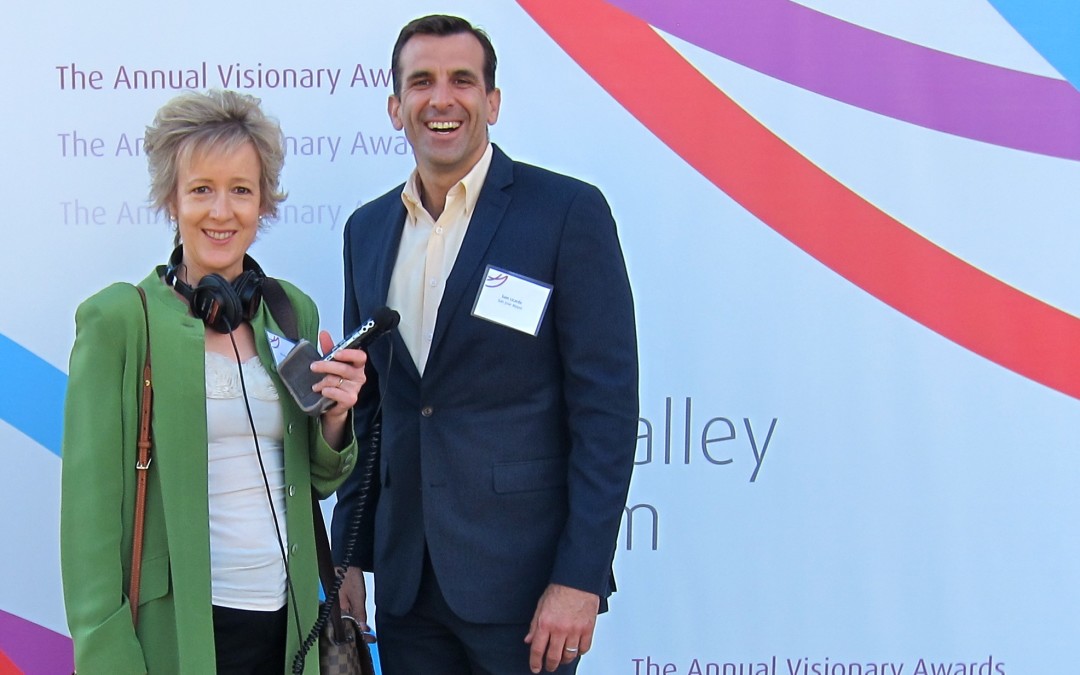By Alison van Diggelen, host of Fresh Dialogues
“Making the world a better place.” This popular mantra of Silicon Valley entrepreneurs is regularly ridiculed by HBO’s popular series, Silicon Valley. For sure, the valley is full of hyperbole and idealistic exuberance, and to many outsiders that may seem completely irrational, insane even, but perhaps it’s a necessary mindset for this innovative region? Are there some entrepreneurs who genuinely want to make the world a better place, not for PR reasons, or to boost their social media following; but just for the sake of it? I attended the 19th annual SVForum Visionary Awards to explore the question.
This is my first report for the BBC World Service tech program, Click.
Listen at the BBC Click podcast (Silicon Valley segment starts at @13:33)
Here’s a transcript of the segment, edited for length and clarity:
Click Radio host, Gareth Mitchell: This is Click from the BBC in London. We talk about technology every week and Silicon Valley is often on the agenda. It’s the kind of place where if you’re a company CEO, and you clock up, say a billion users, most people would say, ‘well that’s incredible,’ but in Silicon Valley, people are likely to say, ‘Oh really?’ It’s almost like a billion seems like a small number, such is the ambition about that place. But Silicon Valley likes to tell us it does have a beating heart through its Visionary Awards and this is where the valley recognizes CEOs and developers who really do want to make the world a better place. From the awards, we have this report from Alison van Diggelen.
Alison van Diggelen: Talk of revolution was in the air in Silicon Valley last week at SVForum’s Visionary Awards. With past recipients like Bill Gates, Elon Musk, and Esther Dyson, these awards have earned a reputation as the Oscars of Silicon Valley. Sam Liccardo, the mayor of San Jose, welcomed guests…
Liccardo: In Silicon Valley we do a great job of innovating; we do a terrible job of celebrating. And it’s important that we stop every once in a while and recognize those who’ve been leading the way and perhaps allow them to inspire us.
van Diggelen: Jennifer Palka is one of this year’s visionary award winners and wants to inspire a revolution by transforming the relationship of the American people with their government. She’s founder of Code for America, a nonprofit that leverages the innovative power of SV technology to help make government work more efficiently, cheaply and openly.
 Pahlka: We’ve been trying to make the guts of government… as sexy as making Facebook. People are buying it… by coming into government, they can change the world.
Pahlka: We’ve been trying to make the guts of government… as sexy as making Facebook. People are buying it… by coming into government, they can change the world.
van Diggelen: Remarkably, Code for America has managed to attract many top techies from companies like Apple, Adobe and Google who apply the SV playbook to government.
Pahlka: We believe that government can work better “for the people and by the people” in the 21st Century…the thing we are doing is bringing the practices of SV – user centered, iterative and data-driven approaches to solving problems – into government…by asking people to come and do a year of service.
van Diggelen: Code for America “fellows” make open source apps to address local issues. These are being scaled from local to national level. It’s now easier to apply for food stamps, connect with city hall via text, and get access to public records online. In San Jose, it helped inspire a (waste no food) app that helps hotels and restaurants redirect excess food to feed SV’s homeless. Pahlka’s innovative model has even been adopted by governments around the world. There’s a Code for Japan, Germany, South Africa, and Pakistan. But what really animates Pahlka is how it’s helping redefine SV’s role in the world.
Pahlka: Silicon Valley gets bad rap – we’ve transformed the world, but increased the inequality in our country.
Silicon Valley isn’t just about wealth creation; it’s about bringing people into our institutions in a profoundly valuable way that connects to the history of our country.
van Diggelen: The history of the United States and the need for an open Internet was also top of visionary award winner Tom Wheeler’s mind. A former tech entrepreneur and VC, Wheeler is now Chairman of the Federal Communications Commission, the FCC, which regulates US phone and cable companies; and fights for net neutrality on behalf of consumers and innovators. Wheeler describes broadband as a major driver of economic growth and likens it to coal during the industrial revolution.
 Wheeler: Broadband, high speed Internet is the essential “commodity” of the 21st Century… You can’t be in a situation where you’ve got gatekeepers deciding which innovators get on…
Wheeler: Broadband, high speed Internet is the essential “commodity” of the 21st Century… You can’t be in a situation where you’ve got gatekeepers deciding which innovators get on…
van Diggelen: The European Union is in the process of following a similar model.
But like many tech innovators, Wheeler has a long list of ambitions, including the fight for consumer privacy.
Wheeler: A network gets to see every place you go on the Internet, everything you do. In the phone world, they couldn’t sell that information without your permission. That doesn’t exist today for networks in the high speed Internet, so we’re proposing that it should. The consumer has right to say whether that information can be productized and sold by their network provider.
van Diggelen: As the celebrations come to a close, I asked serial entrepreneur, Kevin Surace to reflect on the evening.
Surace: We’re living in a time when the innovations are coming faster than we’ve ever seen – in the history of ever – we’re now seeing inventions as powerful as the fire or the wheel every month…the pace of innovation is unbelievable.
van Diggelen: A fitting end to an exuberant Silicon Valley evening, where everyone was pumped by the same revolutionary fervor: to make the world a better place.
Ambi –audience exuberance…fade out
Gareth Mitchell: Not that I want to bring the party down, but do they really want to make the world a better place? They might be nice people, but they’re running businesses, they’re pretty hard hearted entrepreneurs at the end of the day, aren’t they?
LJ Rich: There’s something called corporate social responsibility…it’s nice in a way that some companies would like to give back to the community, but it can’t hurt their social reputation, to be seen to be good, especially when you look at how a company’s social behavior is analyzed online and people will suffer if they’re behaving badly or in a way people aren’t impressed by. So yes, I think it’s very nice and altruistic, but there are always pluses to behaving in a responsible manner and some of these will definitely be impacting the bottom line.
Listen to the whole Click program, featuring reports on the future of the Internet; Wonderlab at London’s Science Museum; and a new virtual reality film called Valen’s Reef (about climate change’s impact on our oceans)




